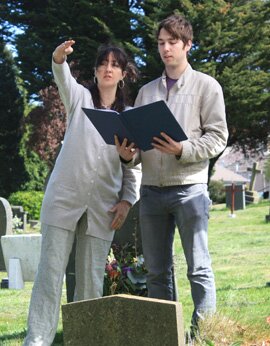This programme was written and is taught by Jane Morrell, Simon Smith and Basira Ward Davies, funeral directors and celebrants. Jane and Simon have their own company in Totnes, and authors of We Need To Talk About The Funeral. Basira is a funeral director and celebrant in Frome.
The Funeral Celebrant’ Diploma programme covers all aspects of being a funeral celebrant and allows the participants to delve deeply into the issues around death, funerals and our own feelings around mortality. But don’t worry, there’s a lightness of touch too.

The Diploma course recognises the wonderful diversity of spiritual beliefs, recognising that most people are unaffiliated to a religion but still believe in something. We see beauty, of words, music and the setting, to be a vital element of a funeral – an expression of love and something transcendent and transformative.
The programme begins with three days together, followed by a gap of three months in which some of the portfolio of assignments is completed, before returning for the final two days. You then have a further 3 months to complete assignments. The total course time is around 250 hours spread over this 6 month period. We believe taking this extra time is vital to building a depth of confidence and assurance. We provide you with a 130 page manual, feedback on assignments and supervision for your first five funerals. On successful completion of the course and the assignments you receive the Green Fuse Funeral Celebrant’s Diploma accreditation certificate and the accreditation body’s (APT) certification. Each course is for a maximum of 8 participants.
The course covers all the information you need to know and includes visiting funeral venues, both traditional and less conventional. We also have an exciting team to bring you vital skills practice, including one-to-one work on reading and presentation skills with actor Pete Joscelyne, voice modes and leading singing with musician and singer Basira Ward.
The training programme is thorough, practical, well-structured and inspiring.

-
History and modern context of funerals
A brief history of funerals
The impact of current social and cultural trends on funerals
Re-visioning funeral ceremonies
What and who is a funeral for? -
Creating Ritual Theatre
What makes a good funeral?
The importance of ritual space
The ceremony as a means of transition
How to create ritual
Appreciating the importance of the place
The roles of beauty and movement
Orchestrating all the elements of the funeral. -
Writing ceremonial scripts
How to structure a funeral ceremony
Preparing opening and closing words
How to write a good eulogy or life story
Reflecting the character and beliefs of the person who has died
Choosing words and poetry
Using poetic, elevated language and idiom
Words for the committal to reflect individual beliefs
Different types of funeral ceremonies for sudden, early and complicated deaths -
Listening and communication – working with families
Working with bereaved people
Active listening skills and practice
Keeping with the agenda of the family
Working with families in conflict
Semi-structured interviewing
Devising a ceremony collaboratively with the family -
Personal presentation skills
Managing yourself and your emotions
Creating a safe emotional space
Developing personal presence and appropriate authority
Speaking in public
Leading singing (even if you ‘don’t’ sing!)
Using your voice for different modes of expression
Being a calm and reassuring presence -
Business and marketing
The business of being a funeral celebrant
Using technology
Knowing your USPs and your local market
Building your local resources
Liaising with other funeral professionals
How to operate as an independent funeral celebrant, including brochures, marketing and charging.
Joining the green fuse guild and celebrants’ forum.